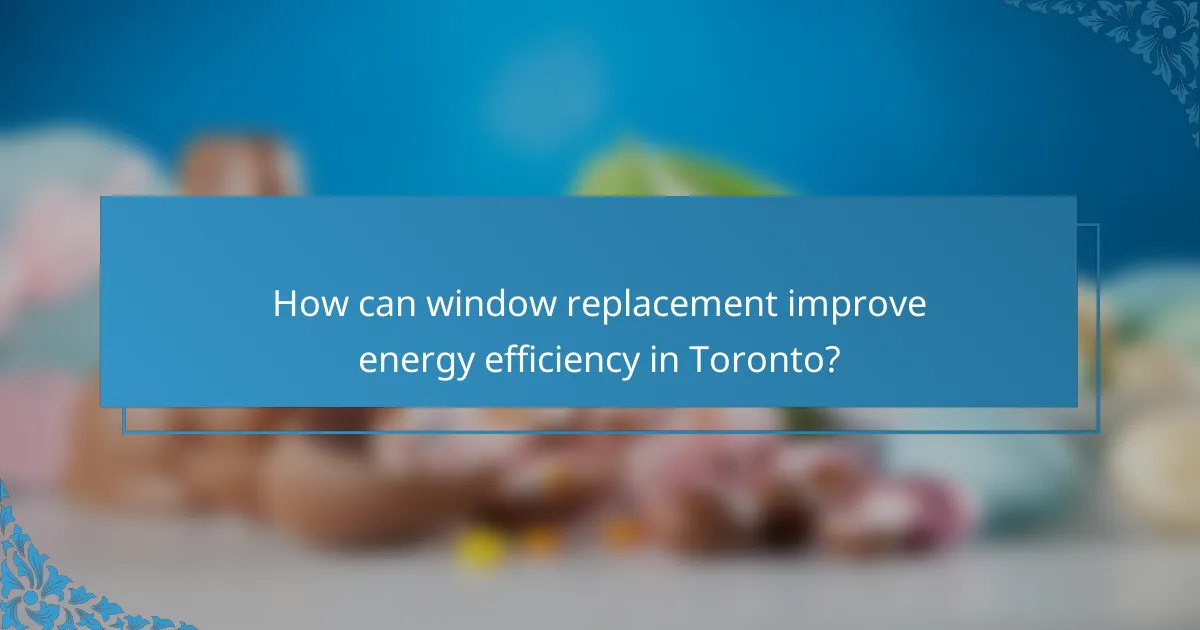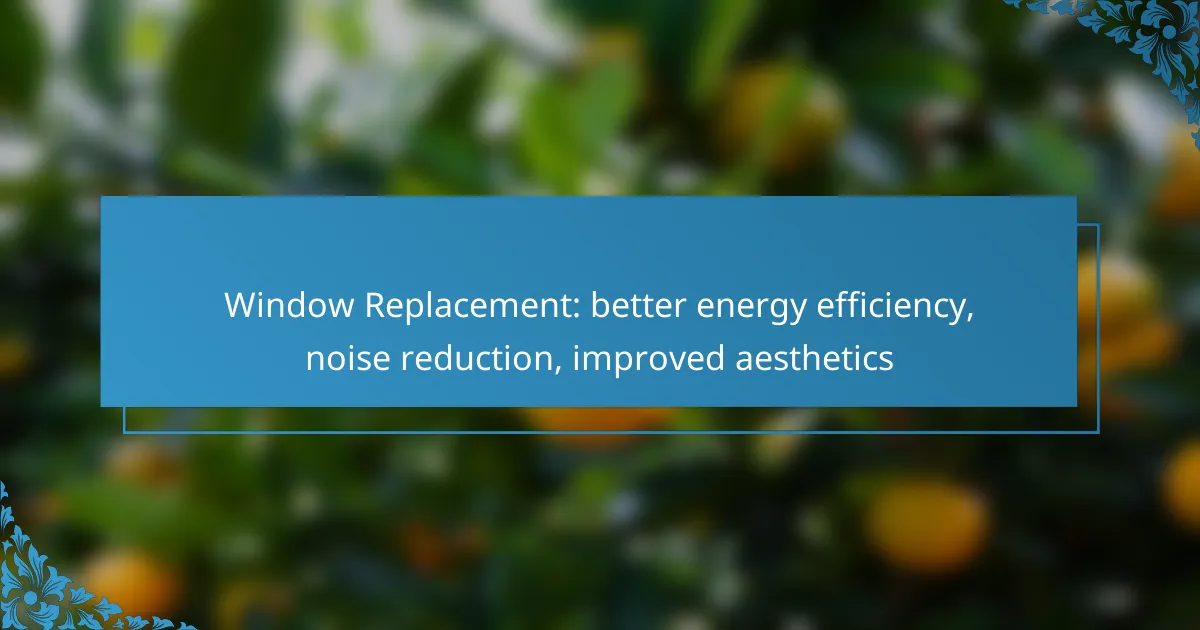Window replacement offers a multitude of benefits, including improved energy efficiency, enhanced noise reduction, and upgraded aesthetics. By installing modern windows, homeowners can reduce energy costs while enjoying a quieter living environment and a more visually appealing home. This investment not only elevates comfort but also contributes to a more sustainable lifestyle.

How can window replacement improve energy efficiency in Toronto?
Window replacement can significantly enhance energy efficiency in Toronto by reducing heat loss in winter and minimizing heat gain in summer. Upgrading to modern windows helps maintain comfortable indoor temperatures, leading to lower energy bills and a reduced carbon footprint.
Low-E glass technology
Low-Emissivity (Low-E) glass is designed to reflect heat while allowing natural light to enter. This technology helps keep indoor spaces warmer in winter and cooler in summer, improving overall energy efficiency. In Toronto’s climate, Low-E coatings can reduce energy costs by up to 30% compared to standard glass.
When selecting Low-E glass, consider the specific coating type that suits your needs. Some coatings are better for colder climates, while others excel in warmer conditions. Consult with a local expert to determine the best option for your home.
Insulated frames
Insulated frames are crucial for enhancing the energy efficiency of new windows. These frames are typically made from materials like vinyl or fiberglass, which provide better thermal insulation than traditional wood or aluminum. A well-insulated frame can significantly reduce air leakage and improve the overall performance of the window.
When choosing insulated frames, look for models with multiple chambers and thermal breaks. This design minimizes heat transfer and can lead to improved energy savings over time, especially in Toronto’s fluctuating temperatures.
Energy Star-rated windows
Energy Star-rated windows meet strict energy efficiency guidelines set by the government. In Toronto, these windows can help homeowners save on heating and cooling costs while contributing to environmental sustainability. Choosing Energy Star-rated products ensures you are investing in quality windows that perform well in local conditions.
To maximize benefits, verify the Energy Star label and check the window’s U-factor and Solar Heat Gain Coefficient (SHGC). These ratings indicate how well the window insulates and blocks heat, guiding you to make informed choices that align with your energy efficiency goals.

What are the noise reduction benefits of window replacement?
Replacing windows can significantly enhance noise reduction in your home, creating a quieter living environment. Newer window technologies, such as double-glazing and acoustic options, effectively block external sounds, making your space more peaceful.
Double-glazed windows
Double-glazed windows consist of two panes of glass separated by a space filled with air or gas, which acts as an insulator. This design reduces sound transmission by absorbing and reflecting noise, making it a popular choice for homes in noisy areas. Homeowners can expect a noticeable decrease in noise levels, often reducing sound by around 30% to 50% compared to single-pane windows.
When selecting double-glazed windows, consider the thickness of the glass and the type of gas used between the panes, as these factors can influence both energy efficiency and noise reduction. Look for windows that meet local energy efficiency standards to maximize benefits.
Acoustic window options
Acoustic windows are specifically designed to minimize sound transmission, featuring thicker glass and specialized frames that enhance their noise-blocking capabilities. These windows can be particularly effective in urban environments or near busy roads, where noise pollution is a concern.
When choosing acoustic windows, check for ratings that indicate their sound transmission class (STC). Higher STC ratings generally mean better noise reduction, with some options achieving STC ratings above 40, making them suitable for high-noise areas.
Sealing and insulation improvements
Proper sealing and insulation around windows are crucial for maximizing noise reduction. Gaps and leaks can allow sound to penetrate, diminishing the effectiveness of even the best windows. Ensuring that windows are installed with high-quality weatherstripping and caulking can significantly enhance their performance.
Consider hiring professionals for installation to ensure that all sealing and insulation measures are correctly applied. Regular maintenance checks can also help identify and address any wear and tear that could compromise noise reduction over time.

How does window replacement enhance aesthetics in homes?
Window replacement significantly enhances the aesthetics of homes by introducing modern designs and styles that can transform the overall appearance. New windows can improve curb appeal and create a more inviting atmosphere inside the home.
Variety of styles and designs
Homeowners can choose from a wide range of window styles, including casement, double-hung, sliding, and bay windows. Each style offers unique visual characteristics that can complement different architectural designs, from traditional to contemporary.
For example, bay windows can create a spacious feel in a room, while casement windows provide a sleek, modern look. Selecting the right style can enhance both the exterior and interior aesthetics of a home.
Custom color options
Many window manufacturers offer custom color options, allowing homeowners to match their windows to their home’s exterior or interior palette. This flexibility can significantly impact the overall look, making it easier to achieve a cohesive design.
Choosing colors that contrast or harmonize with the existing structure can elevate the home’s visual appeal. For instance, a classic white frame can provide a timeless look, while bold colors can make a statement.
Modern frame materials
Modern window frames are available in various materials, including vinyl, fiberglass, and aluminum, each offering distinct aesthetic benefits. Vinyl frames, for instance, can mimic the appearance of wood without the maintenance, while aluminum frames provide a sleek, industrial look.
When selecting frame materials, consider durability and maintenance alongside aesthetics. For example, fiberglass frames are not only visually appealing but also resistant to warping and fading, ensuring long-lasting beauty.

What factors should you consider when choosing replacement windows?
When selecting replacement windows, consider energy efficiency, noise reduction, and aesthetics. These factors significantly impact your home’s comfort, utility costs, and overall appearance.
Local climate conditions
Your local climate plays a crucial role in determining the best type of windows for your home. For instance, in colder regions, double or triple-glazed windows with low-emissivity (Low-E) coatings can help retain heat, while in warmer climates, windows that reflect sunlight can reduce cooling costs.
Consider the average temperature ranges and weather patterns in your area. For example, homes in Ontario may benefit from windows designed to withstand cold winters and hot summers, ensuring year-round comfort.
Building codes in Ontario
Building codes in Ontario dictate specific requirements for window installations, including energy efficiency standards. Familiarize yourself with the Ontario Building Code, which outlines minimum performance criteria for windows, such as U-values and solar heat gain coefficients.
Compliance with these codes is essential not only for safety but also for maximizing energy efficiency. Consult with a local contractor to ensure your chosen windows meet all regulatory requirements.
Budget and financing options
Establishing a budget is vital when choosing replacement windows, as prices can vary widely based on materials, styles, and installation costs. On average, homeowners might spend anywhere from a few hundred to several thousand dollars per window, depending on the specifications.
Explore financing options, such as home improvement loans or energy efficiency rebates, which can help offset costs. Many local and federal programs offer incentives for energy-efficient upgrades, making it more affordable to invest in high-quality windows.

What is the typical window replacement process in Ontario?
The window replacement process in Ontario generally involves several key steps, including an initial consultation, precise measurements, and the actual installation. Homeowners should be prepared for a timeline that can vary based on the complexity of the project and the type of windows chosen.
Initial consultation and assessment
The initial consultation is crucial for understanding the homeowner’s needs and preferences. During this meeting, a professional will assess the current windows, discuss energy efficiency options, and evaluate any specific concerns, such as noise reduction or aesthetics.
Homeowners should prepare questions regarding materials, styles, and potential costs. This is also a good time to inquire about any available rebates or incentives for energy-efficient windows in Ontario.
Measurement and ordering
After the consultation, precise measurements of the window openings are taken to ensure a perfect fit for the new windows. This step is essential, as even minor inaccuracies can lead to issues during installation.
Once measurements are confirmed, homeowners can select their preferred window styles and materials. Ordering typically takes a few weeks, depending on the manufacturer and the complexity of the chosen designs.
Installation timeline
The installation timeline can vary, but most window replacements in Ontario are completed within a day or two for standard projects. Factors such as the number of windows being replaced and the weather can influence this schedule.
Homeowners should plan for some disruption during installation, including potential noise and limited access to certain areas of the home. It’s advisable to discuss the timeline with the contractor to set clear expectations and prepare accordingly.

What permits are required for window replacement in Toronto?
In Toronto, a building permit is generally required for window replacement, particularly if the work involves structural changes or affects the building’s energy efficiency. Homeowners should also ensure compliance with local zoning regulations and energy efficiency standards.
Building permit requirements
To replace windows in Toronto, you typically need to apply for a building permit through the City of Toronto’s Building Division. This process includes submitting plans that detail the proposed changes, including window specifications and installation methods. If the windows are being replaced in a heritage property, additional approvals may be necessary.
Permits can take several weeks to process, so it’s advisable to apply well in advance of your planned installation date. Always check the latest guidelines on the City of Toronto’s official website for any updates or specific requirements related to your project.
Energy efficiency compliance
Window replacements in Toronto must meet specific energy efficiency standards as outlined by the Ontario Building Code. This includes using windows that have a minimum energy performance rating, which helps reduce energy consumption and improve comfort in homes.
Homeowners should consider windows with low-emissivity (Low-E) glass and proper insulation to enhance energy efficiency. Choosing ENERGY STAR® certified windows can also help ensure compliance with local energy standards while potentially lowering heating and cooling costs.
Local zoning regulations
Local zoning regulations in Toronto may impact window replacement projects, especially in designated heritage areas or specific zoning districts. These regulations can dictate the style, size, and placement of windows to maintain the character of the neighborhood.
Before proceeding with window replacement, check with the City of Toronto’s zoning by-law to confirm that your project adheres to local requirements. Engaging with a professional familiar with local regulations can help navigate any complexities and avoid potential fines or delays.
